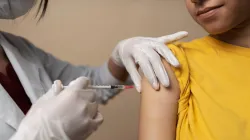HPV Vaccination: Know why it is important for adults aged 35-45 years to remain aware of the vaccine
The HPV vaccine is a crucial tool in preventing several types of cancer, including cervical, anal, and oropharyngeal cancers. HPV vaccine can also protect against certain strains of the virus that have been linked to infertility in women.

Cervical cancer is one of the common types of cancer seen in women causing higher mortality and morbidity rates. The HPV vaccine is vital to prevent cervical cancer and even other cancers. There is a lack of awareness about the HPV vaccination in the general population. The vaccine is given from the age of 9 years or preferably before the age of first sexual activity and even adults aged 35-45 are eligible for the HPV vaccine. Both women and men need to discuss getting vaccinated without fail. By targeting the human papillomavirus, the vaccine significantly reduces the risk of developing potentially life-threatening conditions in recipients. However, it's not just about individual protection and widespread vaccination can lead to herd immunity, slowing down the spread of HPV within communities and ultimately reducing the incidence of related cancers. Debunking myths and emphasizing their safety and efficacy can encourage more people to get vaccinated. There are several reasons which prevent people from getting vaccinated.
Dr Sushruta Mokadam, consultant obstetrician at Motherhood Hospital, Kharadi, Pune said, “There is no knowledge about HPV vaccination. Limited promotion and education campaigns focus on younger populations, and inadequate dissemination of expanded age guidelines contribute to lower awareness of HPV vaccination among older individuals. For adolescents and young adults, it protects potential exposure to HPV and prevents various HPV-related diseases. The vaccine is less effective in the age group 27-45, if already exposed to HPV but can still protect against new HPV types. It is not too late to get vaccinated at age 45. The vaccine may still provide some protection against HPV-related diseases, particularly for those not previously exposed to HPV."
She also added, "The HPV vaccine has shown efficacy in preventing HPV infection and related diseases in older populations. Men can receive the HPV vaccine later in life to protect against HPV-related diseases. Age and vaccination history determine the number of doses, ranging from two doses for individuals aged 9-14 to three doses for those aged 15 and older. HPV vaccination helps to safeguard from new HPV infections but is not effective in treating existing HPV infections or diseases. HPV vaccine gives good results when taken before any exposure to HPV. However, the HPV vaccine is not recommended for use during pregnancy. Women should take this vaccine during the adolescent age for better protection against cervical cancer and other infections. Remember to consult an expert for personalized advice on HPV vaccination based on individual circumstances.”